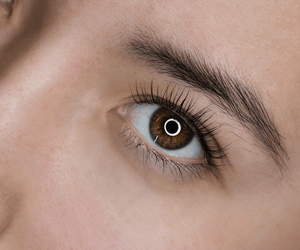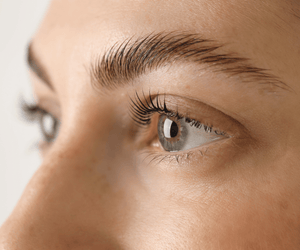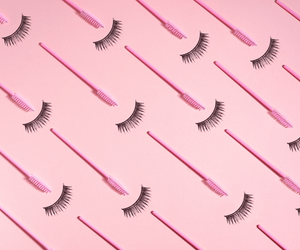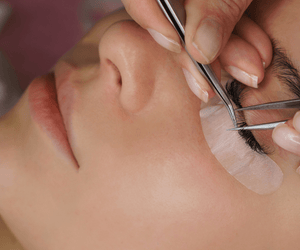Oily eyelids can be frustrating, especially if you’re a makeup lover or lash extension aficionado. In some cases, oiliness can be accompanied by eye irritation and discomfort, making things extra unpleasant.
Understanding why your eyelids are oily is just the start — you need to know the underlying cause, so you can come up with ways to deal with the issue.
In this post, we dive into the reasons why your eyelids could be oily, and offer solutions to the issue so you can achieve happier skin and eyes, better lash retention, and more long-lasting makeup.
Table of Contents
What Causes Oily Eyelids?
Oily skin
In all likelihood, you have oily eyelids as a result of having oily skin. Our skin gets oily as a result of sebaceous gland activity. The sebaceous glands are tiny, oil-producing glands that are attached to the hair follicles.
The oily substance these glands produce is called sebum, and it plays a protective role in the skin barrier. However, too of it makes skin look oily and also contributes to clogged pores and acne.
The sebaceous glands in the eyelid are typically less active than those on other parts of the face, but genetics and hormones may stimulate them to produce more oil than average.
Meibomian gland dysfunction (MGD)
The glands that produce oil along the lash line are called meibomian glands. They produce an oily substance called meibum, which creates a protective film over the eyes. However, inflammation in the meibomian glands can lead to gland dysfunction or MGD, which can cause increased oil production.
Meibomian gland dysfunction usually occurs alongside other conditions, like hormonal disorders, blepharitis, rosacea, seborrheic dermatitis, or allergic reactions. MGD itself often leads to additional symptoms, including discomfort, redness, flakiness, and bumps along the lash line. If the glands get clogged, the reverse can happen, and the eyes may become uncomfortably dry.
Cosmetics
Cosmetics, especially rich eye creams, heavy sunscreens, or oily makeup removers, can also make your eyelids oily. Having cosmetic residue leave an oily film on your eyelids isn’t generally harmful, so you don’t have to change anything.
That said, if the oily residue is interfering with your makeup or getting into your eyes, then your best bet is to switch to lighter, oil-free products. Heavy skincare products can also cause milia, which are firm keratin plugs that look like whiteheads. If you notice such clogs popping up, consider discontinuing the products causing them.
Environment
You may feel like your eyelids get oilier on hot days. Indeed, studies show that there is a correlation between summer weather and increased oil production. This is quite normal, especially if your skin generally fluctuates with the seasons.
Is It Normal to Have Oily Eyelids?
Having oily eyelids isn’t particularly unusual. You are a bit of an outlier in the sense that most people’s eyelids tend to be drier, but it’s nothing extreme or worth worrying about. It’s just a sign that your skin is a little oilier than average.
Having oily eyelids can be an issue if it also interferes with your life or if you have other symptoms like discomfort or skin irritation. If you get redness, flakiness, or styes near the eyes or you experience pain or vision disturbances, consider speaking to a doctor.
When Should You Be Concerned?
Oily eyelids are only a cause for concern if you’re also dealing with other symptoms. See a doctor if you experience pain, swelling, frequent eyelid bumps (styes or chalazions), crusting, lash loss, or vision changes, as these can be indicative of an underlying condition.
Additionally, if you’re having issues wearing makeup or retaining lash extensions because of your oily eyelids, you may want to find cosmetic solutions that will help you control the oil production.
Can You Reduce Eyelid Oiliness?
You can reduce eyelid oiliness with the help of cosmetics and, in some cases, medications.
Cosmetic solutions
For minor oiliness, the best solution is a light skin care routine geared towards controlling oil. Cleanse your eyes gently using an eye-safe cleanser or lash shampoo, and follow it up with a light, non-greasy moisturizer or eye cream. If you wear lash extensions, make sure all of your products are extension-safe and oil-free.
In the daytime, you can use oil-controlling products like mattifying primers or powders. Nowadays, there are even sunscreens designed to offer a mattifying effect.
Eye and skin treatments
If you have a specific condition leading to oily eyelids, it's important to treat the underlying cause. Speak to a doctor to see if you need a specific medication. For quick relief at home, use a warm compress (not hot!) or rinse the eye with a saline solution.
Finally, for excessive oiliness that also causes acne, speak to your doctor about medical interventions. Accutane is an acne medication that can significantly reduce oil production, but it comes with significant side effects and shouldn't be taken for just slight oiliness.
Makeup & Lash Tips for Oily Eyelids
When you wear makeup, having oily eyelids can be the most frustrating. It can make your eyeshadow crease and mascara smudge. There are ways you can control the oiliness to keep lashes and makeup intact:
- Always apply makeup to clean skin.
- Use a blotting sheet to absorb excess oil if you don't want to wash your eyes.
- Use oil-free, mattifying eyeshadow primer before using eye makeup.
- Always layer powder over creamy concealers or eyeliners.
- Use a tubing mascara, which tends to be more oil-resistant than even waterproof mascara.
- Switch out your mascara for DIY lash extensions. These easy-to-apply clusters stay put for days, without any risk of smudging.
If you are a fan of either professional lash extensions or DIY lash clusters, keeping the area clean and dry is key for maintaining adhesion. Make sure to wash your lashes every evening, and use oil-free products at all times.
Bottom Line
Having oily eyelids might be a nuisance, but it's totally normal. Watch out for unusual symptoms beyond the oiliness, like styes or eye irritation. Consider speaking to a medical professional if you experience discomfort or chronic symptoms.
If it's just a shine that you're dealing with, a dialed-in eye care routine is all it takes. Makeup wearers may want to add a few more tweaks to prevent smudging, including switching out mascara for long-wearing DIY lash extensions that stay put for days with less fuss.








